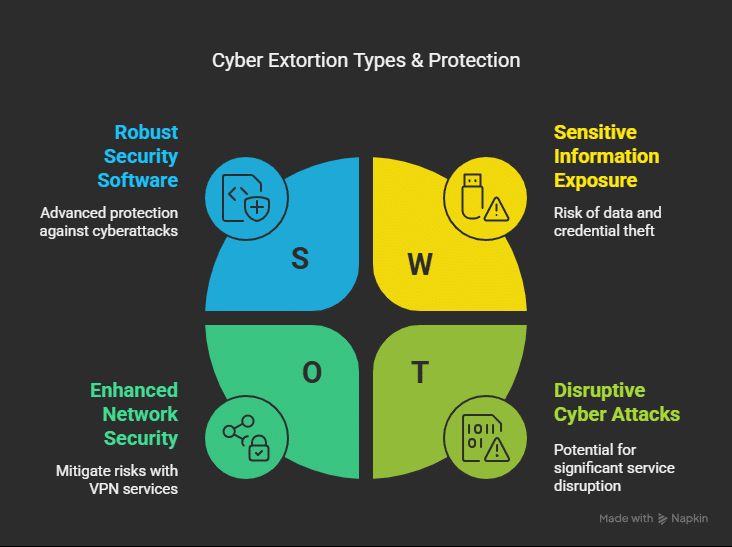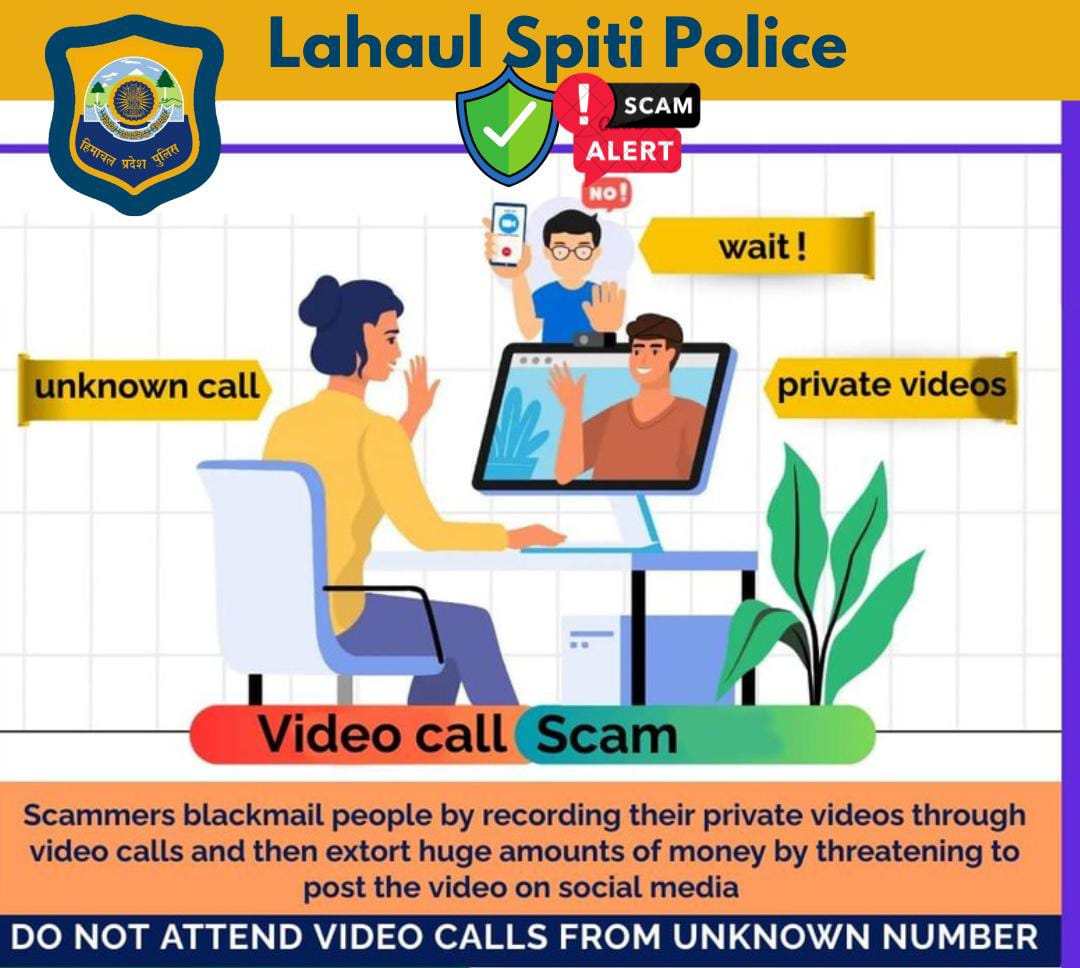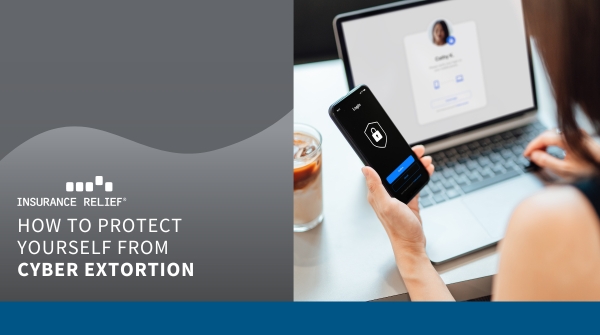Cyber extortion is a growing threat. It can affect anyone online.
Understanding how to protect yourself is crucial. In today’s digital age, our lives are deeply intertwined with the Internet. From personal emails to banking, we rely on online services. Unfortunately, cybercriminals exploit this dependency. They use tactics like ransomware and phishing to extort money. Protecting yourself from these threats requires knowledge and the right tools. This blog post will guide you through essential steps to safeguard your digital life. Learn how to stay safe, secure your data, and avoid falling victim to cyber extortion. For enhanced online security, consider using a reliable VPN service like NordVPN. Read on to discover practical tips and strategies to protect yourself.
Introduction To Cyber Extortion
In today’s digital age, cyber extortion is a growing threat. It involves criminals demanding money or other forms of Payment by threatening to damage, steal, or release sensitive data. Understanding this threat is crucial for protecting yourself online.
What Is Cyber Extortion?
Cyber extortion is a type of cybercrime. Criminals use threats to extort money or other benefits from individuals or organizations. They may threaten to release sensitive data, disrupt services, or damage a company’s reputation.
This crime often involves ransomware. Ransomware is malicious software that encrypts a victim’s data. The criminal then demands a ransom to unlock the data. Sometimes, attackers threaten to publish the stolen data if the ransom is not paid.
Why Cyber Extortion Is A Growing Threat
Cyber extortion is becoming more common for several reasons:
Increased Internet Use: More people and businesses use the Internet, making them potential targets.
Advanced Technology: Cybercriminals use sophisticated tools to launch attacks.
Profitability: Many victims pay the ransom, encouraging more attacks.
These factors make it easier for criminals to commit cyber extortion and remain anonymous.
Consider using a reliable VPN service like NordVPN to protect yourself from cyber extortion. It offers advanced encryption and privacy features to keep your data safe. With NordVPN, you can secure your internet connection, hide your IP address, and enjoy peace of mind.
Understanding Different Types Of Cyber Extortion
Cyber extortion is a growing threat in the digital age. It involves attackers demanding money or other benefits by threatening to harm or expose sensitive information. Understanding the different types of cyber extortion can help you better protect yourself from these threats.
Ransomware Attacks
Ransomware attacks involve malicious software that encrypts your data. The attacker demands a ransom to decrypt it. These attacks can cause significant disruption to both individuals and organizations. To protect against ransomware, use reliable security software like NordVPN, which includes advanced encryption and malware protection.
Phishing Scams
Phishing scams trick you into giving away sensitive information. Attackers often steal login credentials or financial information from fake emails or websites. Always verify the source before clicking on links or providing personal information. Use tools that block phishing attempts, such as the Threat Protection feature in NordVPN.
Doxing And Data Breaches
Doxing involves the release of private information about an individual. Data breaches expose large amounts of sensitive data from organizations. Both can lead to severe consequences. Protect your data by using strong passwords and encryption tools like NordVPN. It hides your IP address and secures your online activity.
Denial Of Service (DoS) Attacks
DoS attacks flood a network or website with traffic, causing it to become unavailable. These attacks can disrupt services and cause financial loss. Use a VPN service with a large server network, such as NordVPN, to mitigate the risk of DoS attacks by distributing traffic across multiple servers.

Type of Attack | Description | Protection Strategy |
|---|---|---|
Ransomware Attacks | Malicious software encrypts data and demands a ransom for decryption. | Use advanced encryption and malware protection. |
Phishing Scams | Tricks users into providing sensitive information through fake emails or websites. | Verify sources and use phishing blockers. |
Doxing and Data Breaches | Release or exposure of private information. | Use strong passwords and encryption tools. |
Denial of Service (DoS) Attacks | Overwhelms a network or website with traffic, making it unavailable. | Use a VPN with a large server network. |
Essential Tips To Protect Yourself From Cyber Extortion
Cyber extortion is a serious threat in today’s digital world. Protecting yourself requires vigilance and implementing several key practices. Below are some essential tips to help you stay safe and secure online.
Regularly Update And Patch Systems
Keeping your systems updated is crucial. Regular updates fix security vulnerabilities that hackers can exploit. Enable automatic updates for your operating system and software. This ensures you have the latest security patches installed.
Use Strong And Unique Passwords
Passwords are your first line of defense. Use strong, unique passwords for each account. A strong password includes a mix of letters, numbers, and symbols. Avoid using easily guessable information like your name or birthdate.
Weak Password | Strong Password |
|---|---|
password123 | R!8k@2#FnL |
myname2021 | Y9$wT!zQ8m |
Enable Two-factor Authentication
Two-factor authentication (2FA) adds an extra layer of security. With 2FA, you must verify your identity using another device or method. This makes it harder for attackers to access your accounts, even if they have your password.
Backup Your Data Frequently
Regular data backups protect you from data loss. Use both cloud storage and external drives for backups. Schedule automatic backups to ensure your data is always safe. If you’re hit by ransomware, you can restore your data without paying a ransom.
Be Wary Of Suspicious Emails And Links
Phishing attacks are common. Be cautious with emails from unknown senders. Do not click on suspicious links or download attachments from untrusted sources. Verify the sender’s email address and look for signs of phishing.
Check for spelling errors in the sender’s email address.
Hover over links to see the actual URL before clicking.
Use Reliable Security Software
Invest in reliable security software like NordVPN. It offers advanced encryption and malware protection. NordVPN also has a strict no-log policy, ensuring your online activities remain private. Its Threat Protection feature scans downloads, blocks trackers, and hides ads.
For enhanced security, consider using additional tools like NordPass (password manager) and NordLocker (file encryption tool). These tools provide comprehensive protection and improve your online security.
For more information, visit NordVPN’s website.

Credit: twitter.com
How To Respond To Cyber Extortion
Cyber extortion can be a stressful experience. Knowing how to respond can help you manage the situation effectively. Here are some essential steps to take:
Immediate Steps To Take
First, remain calm and do not respond to the extortionist. It’s crucial not to engage with the criminal. Disconnect your device from the Internet immediately. This can prevent further damage or data theft. Next, back up important files to an external drive. Check for malware or suspicious software on your device.
Contacting Authorities And Reporting The Incident
Report the incident to local law enforcement. Could you provide them with all the relevant details? They can guide you on legal steps to take. It’s also essential to contact a cybercrime unit if available in your country. Reporting to agencies like the FBI’s Internet Crime Complaint Center (IC3) can be helpful.
Seeking Professional Cybersecurity Help
Consult with a professional cybersecurity expert. They can help identify vulnerabilities. Professionals can assist in securing your system against future attacks. Using services like NordVPN can enhance your online security. NordVPN offers advanced encryption and malware protection features.
Avoiding Payment To Cybercriminals
Never pay the ransom. Paying doesn’t guarantee the extortionist will release your data. It may encourage further criminal activity. Instead, focus on strengthening your cyber defenses. Utilize tools like NordVPN’s Threat Protection to block ads, trackers, and malware.
Steps | Actions |
|---|---|
Immediate Steps | Disconnect from the internet, back up files, and scan for malware |
Contact Authorities | Report to law enforcement and cybercrime units |
Professional Help | Consult cybersecurity experts, use tools like NordVPN |
Avoid Payment | Do not pay ransom, strengthen cyber defenses |
By following these steps, you can protect yourself from cyber extortion effectively.
https://www.youtube.com/watch?v=oSxDN7Mm6nw
Real-World Examples Of Cyber Extortion
Cyber extortion is a growing threat in today’s digital age. Understanding real-world examples can help you grasp the severity and implications of such attacks. These incidents highlight the need for robust security measures like NordVPN to protect your online presence.
High-Profile Cyber Extortion Cases
Several high-profile cyber extortion cases have made headlines, showcasing the tactics used by cybercriminals:
Case | Details |
|---|---|
WannaCry Ransomware | In 2017, WannaCry ransomware infected over 200,000 computers across 150 countries, demanding Bitcoin payments to unlock files. |
Colonial Pipeline Attack | In 2021, the Colonial Pipeline was hit by a ransomware attack, leading to fuel shortages across the U.S. The company paid a ransom of $4.4 million. |
City of Atlanta | In 2018, Atlanta’s government systems were paralyzed by ransomware, demanding $51,000 in Bitcoin. The attack caused significant disruptions and recovery costs. |
Lessons Learned From Real Incidents
From these cases, we can draw several key lessons:
Regular Backups: Ensure you have regular backups of important data to avoid paying ransoms.
Use Strong Security Tools: Invest in security tools like NordVPN to encrypt your internet connection and protect against cyber threats.
Employee Training: Educate employees about phishing attacks and safe online practices to prevent malware infections.
Update Software: Keep all software and systems updated to patch vulnerabilities that cybercriminals exploit.
Implementing these lessons can significantly reduce the risk of falling victim to cyber extortion.

Credit: www.insurance-relief.com
Conclusion And Final Recommendations
Cyber extortion is a serious threat in today’s digital world. Protecting yourself online requires vigilance and the right tools. Following these final recommendations can enhance your online security and reduce the risk of falling victim to cyber extortion.
Summarizing Key Points
Throughout this blog, several critical strategies were discussed to safeguard against cyber extortion:
Stay vigilant: Always be cautious of suspicious emails and links.
Use strong passwords: Utilize unique and complex passwords for different accounts.
Enable two-factor authentication: Add an extra layer of security to your accounts.
Keep software updated: Regularly update your operating system and applications.
Backup data: Regularly back up your important files in a secure location.
Educate yourself: Stay informed about the latest cyber threats and security practices.
Final Tips For Staying Safe Online
To further enhance your online security, consider the following additional tips:
Use a VPN: A VPN service like NordVPN can encrypt your internet connection and protect your privacy. NordVPN offers advanced encryption (AES-256), Double VPN, and Onion Over VPN. It ensures your online activity remains private and secure.
Install security software: Utilize antivirus and anti-malware software to protect your devices from malicious attacks. NordVPN’s Threat Protection feature can scan downloads, block trackers, and hide ads.
Avoid public Wi-Fi: Use a VPN to secure your connection on public Wi-Fi networks. NordVPN is ideal for travelers needing secure public Wi-Fi access.
Monitor your accounts: Regularly check your financial and online accounts for unauthorized activity.
Stay informed: Follow reputable sources for the latest news and updates on cybersecurity threats.
By implementing these strategies and using tools like NordVPN, you can significantly reduce the risk of cyber extortion and enjoy a safer online experience.
Frequently Asked Questions
How Can Cyber Extortion Be Prevented?
Regularly update software, use strong passwords, enable two-factor authentication, train employees on phishing, and back up data frequently.
How To Protect Yourself From Online Extortion?
Protect yourself from online extortion by using strong passwords and enabling two-factor authentication. Avoid sharing personal information. Keep software updated. Be cautious of suspicious emails and links. Report any extortion attempts to the authorities immediately.
How Can You Protect Yourself From A Cyber Attack?
Protect yourself from a cyber attack by using strong passwords, updating software regularly, enabling two-factor authentication, avoiding suspicious links, and installing antivirus programs.
Can Police Do Anything About Cyber Extortion?
Yes, police can investigate cyber extortion. They can track perpetrators, gather evidence, and work with cybersecurity experts. Always report cyber extortion immediately.
Conclusion
Stay vigilant to protect yourself from cyber extortion. Use strong, unique passwords. Regularly update your software and systems. Be cautious with emails and links. Consider using a reliable VPN like NordVPN for enhanced privacy and security. It’s essential to stay one step ahead of cyber threats. Practice safe online habits to maintain your peace of mind. Remember, your online safety is your responsibility. Stay safe and secure.
